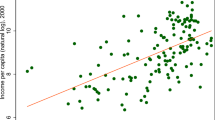Abstract
Using the device of generational accounting, this paper assesses the distribution of lifetime net tax payments across gender and generations in Denmark. We find two significant biases associated with the current structure and stance of public finances. First, not only do men contribute a much large share of their lifetime incomes to the government than women, womens' net payments are even negative. Second, the tax burden on future generations is likely to be substantially higher than the tax burden on current generations.
Similar content being viewed by others
References
Andersen D, Appeldorn A, Weise H (1996) Orlov-evaluering of orlovsordningerne. Rapport No. 96-11, Socialforskningsinstituttet, Copenhagen
Auerbach A, Gokhale J, Kotlikoff L (1991) Generational accounts — a meaningful alternative to deficit accounting. In: Bradford D (ed.) Tax policy and the economy, MIT Press
Auerbach A, Gokhale J, Kotlikoff L (1994) Generational accounting — a meaningful way to evaluate fiscal policy. Journal of Economic Perspectives 8:73–94
Boll S, Raffelhüschen R, Walliser J (1994) Social security and intergenerational redistribution: A generational accounting perspective. Public Choice 81:79–100
Buiter W (1995) Generational accounts, aggregate saving and intergenerational distribution. NBER Working Paper No. 5087
Eurostat (1994) Poverty statistics in the late-1980s: Research based on micro-data. Brussels
Fehr H, Kotlikoff L (1995) Generational accounting in general equilibrium. Finanzarchiv 52:1–27
Franco D, Gokhale J, Guiso L, Kotlikoff L, Sartor N (1991) Generational accounting: The case of Italy. The Ruth Pollak Working Paper Series on Economics, No. 18, Boston University
Gokhale J, Raffelhüschen B, Walliser J (1997) The burden of German unification: A generational accounting approach. Finanzarchiv 52:141–160
Haveman R (1994) Should generational accounts replace public budgets and deficits?. Journal of Economic Perspectives 8:95–111
Jensen SH, Nielsen SB (1995) Demographic transition and old age provision in Denmark. Scandinavian Population Studies 10:143–160
Johnson P (1993) Ageing and European economic demography. In: Johnson P, Zimmermann K (eds.) Labour market implications of European Ageing, Cambridge University Press
Kotlikoff L (1992) Generational accounting—knowing who pays, and when, for what we spend. Free Press
Kotlikoff L (1993) From deficit delusion to the fiscal balance rule: Looking for an economically meaningful way to assess fiscal policy. Journal of Economics 7:17–41
Kotlikoff L, Walliser J (1995) Applying generational accounting to developing countries. mimeo, Boston University
Lindbeck A, Molander P, Persson T, Petersson O, Sandmo A, Swedenborg B, Thygensen N (1994) Turning Sweden around. MIT Press, Cambridge
OECD-Organization for Economic Cooperation and Development (1995) Economic outlook. No. 57, Paris
OECD-Organization for Economic Cooperation and Development (1996) Economic surveys-Denmark, Paris
Raffelhüschen B, Risa A [1997] Generational accounting and intergenerational welfare. Public Choice 93:149–163
Ølgaard A (1995) Borgerløn ad bagdøren. mimeo, University of Copenhagen
Author information
Authors and Affiliations
Rights and permissions
About this article
Cite this article
Jensen, S.E.H., Raffelhüschen, B. Generational and gender-specific aspects of the tax and transfer system in Denmark. Empirical Economics 22, 615–635 (1997). https://doi.org/10.1007/BF01205783
Received:
Accepted:
Issue Date:
DOI: https://doi.org/10.1007/BF01205783




